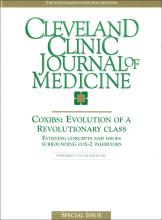ABSTRACT
Therapy with nonselective nonsteroidal anti-inflammatory drugs (NSAIDs) has long been the cornerstone of pharmacologic management of patients with osteoarthritis (OA) and rheumatoid arthritis (RA). Many patients with OA or RA, however, are at increased risk of developing clinically significant adverse events associated with NSAID therapy, particularly upper gastrointestinal (GI) complications including symptomatic and complicated ulcers. The introduction of cyclooxygenase (COX)-2–selective inhibitors (coxibs) represents a major advance in the pharmacologic approach to the signs and symptoms of arthritis. In addition to the first two members of this class, celecoxib and rofecoxib, other coxibs have been introduced or are in development (valdecoxib, etoricoxib). In numerous clinical trials, coxibs have been shown to be as effective as nonselective NSAIDs in relieving pain and inflammation associated with OA and RA, and notably, with a significantly lower risk of NSAID-type adverse events. The use of coxibs to treat OA and RA is recommended as first-line therapy when symptoms of pain and inflammation are present in patients vulnerable to potential NSAID-associated GI toxicity.
- Copyright © 2002 The Cleveland Clinic Foundation. All Rights Reserved.






